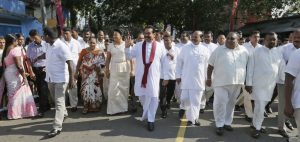Sri Lanka’s August 5 parliamentary election results are being interpreted by some as an indication that the Tamils of the country are moving away from regional Tamil-nationalist parties — focused on ethnic rights, wartime accountability, and power-sharing — to political groups with a countrywide presence that emphasize economic development. But similar election results in the past did not blunt their demand for rights and justice.
The Tamils fought a 30-year civil war in the Indian Ocean island for secession, accusing the majority Sinhalese of using state machinery to discriminate and deny them their rights. The fighting came to an end in May 2009 with the military defeat of the rebel Liberation Tigers of Tamil Eelam (LTTE) by government forces. The toll the fighting took on civilians led to a UN body all but accusing the LTTE and the Sri Lankan government of war crimes and crimes against humanity.
In the decade since fighting ended without the political roots of their discontent being addressed, Tamils have tried to use the parliament, despite its history of Sinhala majoritarian politics, to advance accountability for wartime atrocities and guarantee at least minimal power-sharing.
The strategy followed by the Tamils was simple: Keep electing en bloc a regional Tamil-nationalist party from the country’s north and east, areas with Tamil-speaking majority. Unfortunately, the party chosen – the Tamil National Alliance (TNA) – delivered little. It is accused of prioritizing collaboration with the government over pushing accountability or Tamil rights, and has a poor record of fulfilling election promises.
So, Tamils on August 5 voted differently. In the northern Jaffna electoral district, they apportioned their vote among three nationalist parties. It resulted in the TNA securing only 10 seats of the 16 it won in the August 2015 parliamentary elections. But the Tamil National People’s Front won two seats, while the Tamil Makkal Thesiya Kootani got one.
Meanwhile, voters from the north and east supporting parties with ties to the central government in Colombo were also willing to increase support for their choice. The Sri Lanka Freedom Party (SLFP), which won a seat in the Jaffna District after many years, has integral links to the stridently Sinhala-nationalist government of President Gotabaya Rajapaksa. Former paramilitary groups with close ties to Rajapaksa also made gains: the Eelam People’s Democratic Party (EPDP) from the North increased its seats to two from one in 2015, while Tamil Makkal Viduthalai Puligal (TMVP) from the Batticaloa District in the East secured two.
As a politician with ties to the governing party in Colombo, SLFP’s Jaffna District candidate Angajan Ramanathan promised to reduce high levels of unemployment and poverty there. This triggered the observation that Tamils have voted for economic development in place of rights and favored pro-government parties instead of Tamil nationalist ones.
However, a single seat for the SLFP and two seats for the EPDP in the North is not wholesale repudiation of Tamil nationalism. Election results from Jaffna show these trends have persisted from 2015, when the first competitive parliamentary election after the civil war’s end was held. In 2015 too, the Jaffna District elected a single parliamentarian from what was the then ruling coalition, the United National Front for Good Governance (UNFGG).
Similarly the EPDP, despite its long and unsavory association with Jaffna, won one seat there in 2015. It has won at least one seat in Jaffna in every parliamentary election since 1994.
Furthermore, the two seats won by the pro-government TMVP in Batticaloa is not new. In 2015 too, the UNFGG and the Sri Lanka Muslim Congress, a political ally, won two seats in the district.
In the same way, governments in Colombo with representation in the North and East promising political patronage in the form of economic development is not unique to the 2020 election. The UNFGG spoke about it when in power with Prime Minister Ranil Wickremesinghe pledging in 2017 that “Jaffna will return to its original status and become an economic centre.” However, little was accomplished.
In a region of the country that has suffered from poverty and unemployment in the post-civil war years, economic development is vital irrespective of the political party that initiates it. But economic development or human rights need not be a binary choice in general.
Although Tamils voted pro-government candidates in 2015 and were promised chimerical economic development, it did not bar them from agitating for their rights. Some of their most vocal non-violent demonstrations — protesting disappearances, political prisoners and land grabbing by the military — were launched when UNFGG was in office. And protests continued uninterrupted from February 2017 until the COVID-19 pandemic forbade public assembly in the face of intimidation and betrayal.
Unfortunately, although economic development and human rights can go hand in hand, there is little prospect of that happening in Sri Lanka. With the Tamil struggle for rights, power sharing and justice expected to go on, a crackdown is inevitable. When that happens, human rights activists and the Tamil population will hopefully get the backing of the Tamil-nationalist parties and not the excuse of “working with President Rajapaksa” to stand by passively as atrocities mount. They should oppose coercion, protect the people, and collectively strive to fulfill Tamil aspirations.
S. Tissainayagam worked in English-language national newspapers in Sri Lanka for over 25 years. He won the CPJ International Press Freedom Award (2009) and was Nieman Fellow in Journalism at Harvard ’11.

































